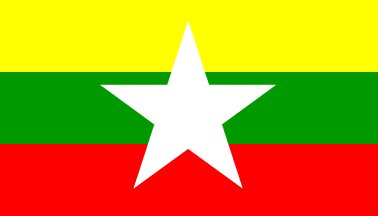That would constitute great progress for a man who does not care about Afrikans.
----- Original Message -----From: Kwabena Akurang-ParrySent: 11/17/2012 2:31:51 PMSubject: RE: USA Africa Dialogue Series - Mr. Obama, It Is MyanmarOga Bangura, I am sure that very soon you would criminalize Obama for choosing to have Kenyan tea instead of Columbian coffee.--
Kwabena.
Date: Sat, 17 Nov 2012 12:11:50 -0500
From: theai@earthlink.net
To: USAAfricaDialogue@googlegroups.com
Subject: USA Africa Dialogue Series - Mr. Obama, It Is Myanmar
CC: leonenet@lists.umbc.edu
Mr. Obama, it is Myanmar, the country with the new African-Centered flag:
Naming dilemma for Obama: Is it Burma or Myanmar?WASHINGTON (AP) — President Barack Obama's landmark visit to Myanmar, known by the U.S. as Burma, brings up an unusual problem of protocol: What does he call it?MATTHEW PENNINGTONFrom Associated PressNovember 17, 2012 10:10 AM EST
If recent practice by visiting U.S. officials is any guide, Obama will sidestep the issue by using neither name Monday when he becomes the first sitting American president to visit the country.
The former ruling junta summarily changed the name 23 years ago without consulting the people — a typically high-handed act by an unpopular regime that had gunned down hundreds of anti-government protesters the year before. The change was opposed by democracy advocates, who stuck with "Burma."
As the country has opened up politically, shifting from five decades of direct military rule, the linguistic battle lines have blurred some.
The U.S., Britain, Canada and New Zealand still officially refer it to it as Burma. But as the relations with the reformist government of President Thein Sein have blossomed in past year and dignitaries have beaten a path to his door, they have become less dogmatic about using the old name.
Last December, when Secretary of State Hillary Rodham Clinton became the highest-ranking U.S. visitor to Myanmar in 56 years, she mostly referred to it as "this country" and did the same this September when she met Thein Sein in New York and announced easing of sanctions. Visiting U.S. senators have used both names. Even at congressional hearings in Washington, there's an occasional mention of "Myanmar."
"Burma" is something Myanmar officials can get sore about.
"You might think this is a small matter, but the use of 'Myanmar' is a matter of national integrity," Foreign Minister Wanna Maung Lwin told visiting U.S. envoy Joseph Yun in May 2011, according to the Myanmar Times newspaper. "Using the correct name of the country shows equality and mutual respect."
This summer, Myanmar authorities also warned opposition leader Aung San Suu Kyi after she used "Burma" during high-profile trips abroad, saying "Republic of the Union of Myanmar" is enshrined in the constitution. She asserted her right to say what she wants but has also said she's open to either name.
"It's for each individual to make his or her own choice as to which he or she uses," the Nobel laureate said in a Washington speech in September that many interpreted as a green light for the U.S. to change its policy.
The truth is that for most Burmese, the name debate doesn't matter.
Myanmar, comprising a vast array of ethnic groups, did not exist as a single entity until it was colonized by the British in the 19th century. The country achieved independence in 1948 and took the English language name used by its former rulers, Burma.
But it was formally known in Burmese, the national language, as "myanma naing ngan" or more colloquially as "bama pyi" or "country of Burma." Both those usages persist, and the national anthem still refers to "bama pyi."
When the name was changed in 1989, it applied only to the English language title.
"When the name was changed it was a political statement," said San San Hnin Tun, a lecturer in Burmese language and visiting scholar at Cornell University. "It did not change how people refer to the country in Burmese."
The junta justified it as shedding a legacy of colonial rule and better reflecting the country's ethnic mix. In reality, both "myanma" and "bama" denote the dominant Burman ethnic majority. There are 135 ethnic groups, and minorities have long fought for more autonomy.
The junta actually entrenched Burman cultural control. It Burmanized many place names, angering minority groups.
There's plenty of precedent for a nation changing its title or place names, particularly during decolonization or regime changes. Western nations have sometimes been slow to catch on. It took decades for China's preferred English spelling of Beijing to become the norm in the West, instead of Peking, and years for India's commercial center to become known as Mumbai instead of Bombay.
The politically charged case of "Myanmar" has been particularly tricky, and usage has widely varied among governments and international organizations.
Australia and the European Union use "Myanmar," although they've otherwise been in lockstep on policy with the U.S. and Britain, which use "Burma." Among rights groups, Amnesty International uses "Myanmar," but Human Rights Watch says "Burma." Among news media, The New York Times has used "Myanmar" since 1989; the main international news agencies including The Associated Press followed suit in 1998, but the BBC still sticks with "Burma." The Financial Times switched to "Myanmar" this January.
--
You received this message because you are subscribed to the "USA-Africa Dialogue Series" moderated by Toyin Falola, University of Texas at Austin.
For current archives, visit http://groups.google.com/group/USAAfricaDialogue
For previous archives, visit http://www.utexas.edu/conferences/africa/ads/index.html
To post to this group, send an email to USAAfricaDialogue@googlegroups.com
To unsubscribe from this group, send an email to USAAfricaDialogue-
unsubscribe@googlegroups.com
You received this message because you are subscribed to the "USA-Africa Dialogue Series" moderated by Toyin Falola, University of Texas at Austin.
For current archives, visit http://groups.google.com/group/USAAfricaDialogue
For previous archives, visit http://www.utexas.edu/conferences/africa/ads/index.html
To post to this group, send an email to USAAfricaDialogue@googlegroups.com
To unsubscribe from this group, send an email to USAAfricaDialogue-
unsubscribe@googlegroups.com

No comments:
Post a Comment